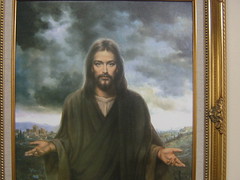The Meaning of Jesus, two visions, by Marcus J. Borg and N.T. Wright
This book is a contrasting of Christian positions by two of the leading scholars N.T Wright on the conservative side and on the liberal side is Marcus J. Borg. Interestingly I would not call either as representatives of the 'Liberal' or 'Conservatives'. Borg represents 'progressive Christianity' which has elements of liberal thought. While N.T. Wright is a bit of a radical within 'evangelical' circles. Never the less both have very contrasting positions which in itself is useful for learning and understanding.
Borg's position calls into doubt traditional Christian orthodoxy, through what he calls pre and post Easter. Post Easter is when the Bible is written. Often by people who had never meet Jesus and often decades after Jesus death.
With the 'Post-Easter' story, Jesus has started to take on a story of its own, which is different from the 'Historical Jesus'. The Post-Easter story now contains myth and is flourished with exaggeration of the true story which happened 'Pre-Easter'. Much discussion occurs about the reliability of biblical sources and the quest for the 'Historical Jesus'. A very important question for all Christians and those interested in Christianity.
Interestingly Borg does not argue with Jesus been the 'Messiah' or any other terms which has been given to him after the 'post-Easter' period. What he writes which is important during the 'Post-Easter' period is that Jesus became and is becoming the 'Messiah'. In other words; was Jesus the Messiah 'Pre-Easter?' No. Was Jesus the Messiah 'Post-Easter?' Yes.
I found Borg's writing on the 'Truth' and of Biblical accuracy of the Biblical text interesting. Much of the argument boiled down to the historical factuality of the Bible. Borg writes:: 'The issue, rather, whether the truth of a gospel story is dependent upon its being grounded in a particular historical event. Tom says "yes" and I say "No". This can pretty much sum up much of the books and its argument.
I think as time goes on Borg's position will become stronger. Time in my opinion does blur things.
I found N.T Wrights contextualisation of the political nature of the times when Jesus was alive, inspiring. Jesus portrayed as a political revolutionary. Wedged between the Roman powers and his Jewish heritage.I can see many modern day examples of this with Australian Jarrod McKenna and American Shane Clayborne.
Overall well worth reading. It helped me sharpen my own thoughts, as well as give me a greater understanding for both liberal and evangelical positions on the Gospels and Jesus.





